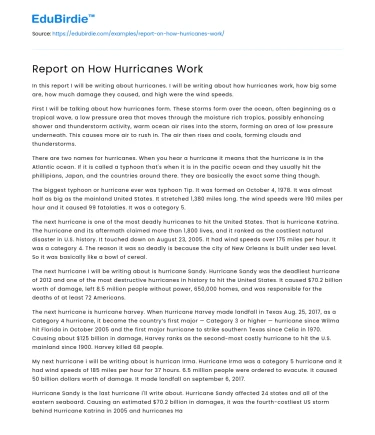In this report I will be writing about hurricanes. I will be writing about how hurricanes work, how big some are, how much damage they caused, and high were the wind speeds.
First I will be talking about how hurricanes form. These storms form over the ocean, often beginning as a tropical wave, a low pressure area that moves through the moisture rich tropics, possibly enhancing shower and thunderstorm activity, warm ocean air rises into the storm, forming an area of low pressure underneath. This causes more air to rush in. The air then rises and cools, forming clouds and thunderstorms.
There are two names for hurricanes. When you hear a hurricane it means that the hurricane is in the Atlantic ocean. If it is called a typhoon that's when it is in the pacific ocean and they usually hit the phillipians, Japan, and the countries around there. They are basically the exact same thing though.
The biggest typhoon or hurricane ever was typhoon Tip. It was formed on October 4, 1978. It was almost half as big as the mainland United States. It stretched 1,380 miles long. The wind speeds were 190 miles per hour and it caused 99 fatalaties. It was a category 5.
The next hurricane is one of the most deadly hurricanes to hit the United States. That is hurricane Katrina. The hurricane and its aftermath claimed more than 1,800 lives, and it ranked as the costliest natural disaster in U.S. history. It touched down on August 23, 2005. It had wind speeds over 175 miles per hour. It was a category 4. The reason it was so deadly is because the city of New Orleans is built under sea level. So it was basically like a bowl of cereal.
The next hurricane I will be writing about is hurricane Sandy. Hurricane Sandy was the deadliest hurricane of 2012 and one of the most destructive hurricanes in history to hit the United States. It caused $70.2 billion worth of damage, left 8.5 million people without power, 650,000 homes, and was responsible for the deaths of at least 72 Americans.
The next hurricane is hurricane harvey. When Hurricane Harvey made landfall in Texas Aug. 25, 2017, as a Category 4 hurricane, it became the country’s first major — Category 3 or higher — hurricane since Wilma hit Florida in October 2005 and the first major hurricane to strike southern Texas since Celia in 1970. Causing about $125 billion in damage, Harvey ranks as the second-most costly hurricane to hit the U.S. mainland since 1900. Harvey killed 68 people.
My next hurricane i will be writing about is hurrican Irma. Hurricane Irma was a category 5 hurricane and it had wind speeds of 185 miles per hour for 37 hours. 6.5 million people were ordered to evacute. It caused 50 billion dollars worth of damage. It made landfall on september 6, 2017.
Hurricane Sandy is the last hurricane i'll write about. Hurricane Sandy affected 24 states and all of the eastern seaboard. Causing an estimated $70.2 billion in damages, it was the fourth-costliest US storm behind Hurricane Katrina in 2005 and hurricanes Harvey and Maria in 2017. It had wind speeds of 115 miles per hour.






 Stuck on your essay?
Stuck on your essay?

